European Parliament for inclusive polls
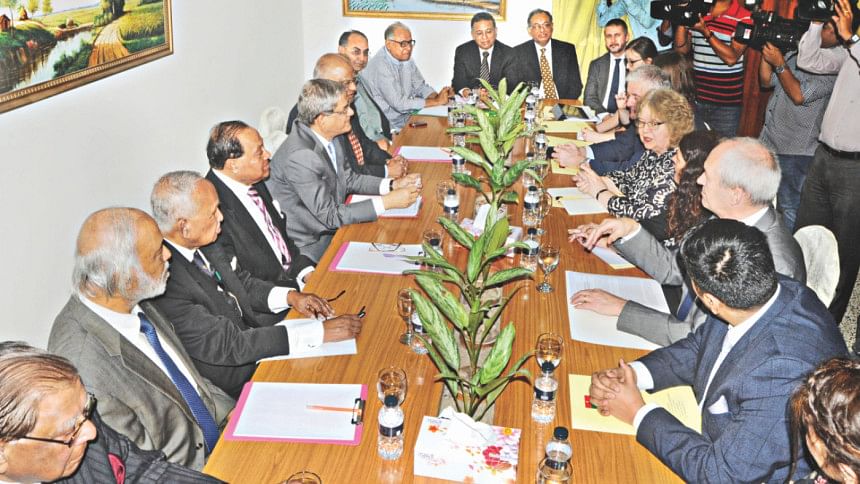
A visiting European Parliament delegation has called for an inclusive parliamentary election in Bangladesh, and said it is important for the BNP to concentrate on the polls.
It hopes all political parties would be willing to contest the upcoming polls to ensure people have a real choice at the ballot box.
The delegation has also said the BNP faces a “challenge” following its Chairperson Khaleda Zia's sentencing in a corruption case.
“We would agree that the situation is a difficult one but as a political party it is important for the BNP to concentrate on the upcoming election,” Jean Lambert, chair of the European Parliament Delegation to South Asia, said at a press conference at the European Union Embassy in Dhaka yesterday.
“…it [sentencing of Khaleda] certainly presents a challenge to madam Zia's party,” she said.
“We know there have been challenges so far in terms of organising, in terms of actually being able to conduct the [election] campaign [by the BNP], so this is something we raised with the Election Commission [of Bangladesh]."
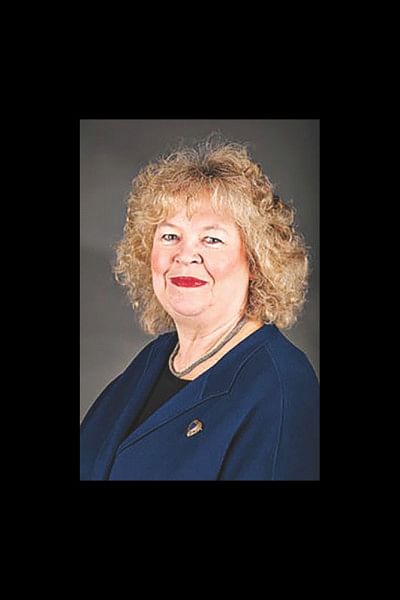
Responding to a question, Lambert said the delegation would talk to BNP leaders to know the party's view on these issues.
Four European Parliament delegations comprised of 11 lawmakers arrived in Dhaka early this week to see the plight of the Rohingya refugees as well as political, trade and human rights situation in Bangladesh.
On the last day of its four-day visit, the delegation headed by Lambert yesterday met the chief election commissioner, the PM's international affairs adviser, the labour and employment minister, the state minister for foreign affairs, the commerce secretary, BNP leaders and also members of the civil society.
On Tuesday, it held a meeting with the Speaker of Jatiya Sangsad and discussed the next general election, the labour situation, freedom of expression and press freedom.
Lambert hoped the political environment in Bangladesh would become “less confrontational and less hostile” in the coming months facilitating the holding of an inclusive election.
She urged the Bangladesh authorities to create the necessary conditions for an inclusive, free and fair general election. This is something of real importance for the people of Bangladesh who deserve that choice.
The chair of the delegation said they asked the EC to do what it can to “enforce rules so that it's fair to all parties that are contesting the elections”
She said they discussed with the EC how the next national polls can be inclusive, free and fair, and also the issues related to budget, capacity building and election management.
Lambert further said they also enquired the EC about its independence and whether it would be able to safeguard the election as an independent body.
And the delegation got “a very positive” answer which she considered as a “good and positive” signal.
She also put emphasis on press freedom as well as freedom of assembly.
Replying to a query, Lambert said civil society members raised before the delegation the issue of draft digital security act with questions whether the act will allow freedom of expression for civil society as well as the media.
She said the government had assured them that the amended ICT act, once finalised, would not affect the civil society.
“We look forward to seeing what the draft would be.”
In a written statement, the European parliamentarians, however, regretted the deterioration of the human rights situation over the past few years, saying they took note of reports on hindrance to freedom of assembly and freedom of expression, enforced disappearances, extra-judicial killings and violence against women.
They also recalled that the issue of child marriage remains a serious concern, and that violence against secular writers and bloggers, members of religious minorities and LGBTI people must end.
The delegation urged the Bangladesh authorities to step up efforts to address these concerns.
It also lauded a number of positive developments in several areas, including reduction of poverty, as well as the overall economic development in Bangladesh.
Bangladesh's likely graduation to middle-income country status will require a transitional process to implement and monitor the required International Labour Organisation Conventions, read the statement.
The European parliamentarians said that in the current Multiannual Indicative Programme 2014-2020, up to €690 million have been earmarked in EU support for Bangladesh and reiterated their wish to remain engaged and to further support Bangladesh in areas such as human rights, good governance and environment.
They hoped the “impressive economic growth of the past years and the encouraging progress in the fight against poverty, which have made Bangladesh an important trading partner of the European Union, will further help achieve the goals to which it has committed, in a more inclusive manner”.
EU Ambassador to Bangladesh Rensje Teerink was also present at the press conference.

 For all latest news, follow The Daily Star's Google News channel.
For all latest news, follow The Daily Star's Google News channel. 

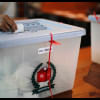

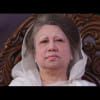

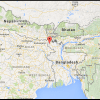


Comments